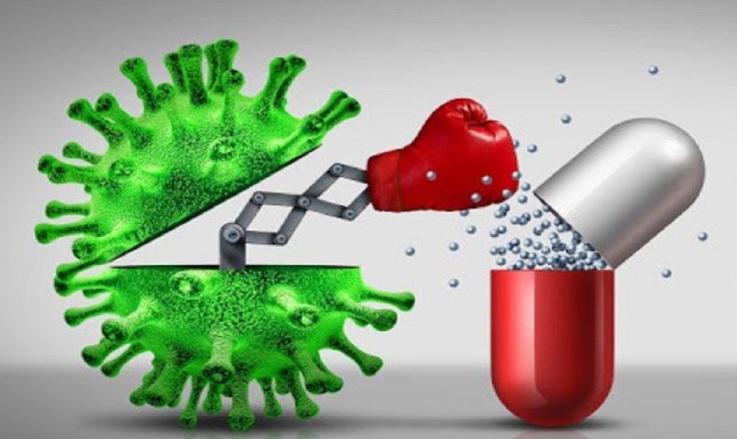
Antibiotics, Bacteria & Long-Term Impact on Immunity, Microbiome
Barkat Health & Pharmaceutical Group: Antibiotics are recognized as one of the most significant medical breakthroughs of the 20th century, fundamentally altering the treatment of bacterial infections. Since the discovery of penicillin by Alexander Fleming, antibiotics have saved the lives of millions of people, rescuing them from diseases that were previously fatal. These drugs are particularly effective in treating conditions such as pneumonia, meningitis, tuberculosis, and various other bacterial infections, often saving the lives of patients who would otherwise have succumbed. However, the misuse, overuse, and prolonged consumption of antibiotics can have numerous adverse effects on the body’s health.
One of the most significant negative impacts of antibiotics is the disruption of the body’s microbiome. The human microbiome, particularly in the gut, consists of millions of microbes that play essential roles in various physiological processes such as digestion, vitamin production, and immune system regulation. When this microbiome is disturbed, it can lead to consequences such as digestive disorders, a weakened immune system, and the onset of autoimmune diseases.
This report will explore the effects of antibiotic use on the body’s microbiome and immune system.
Impact of Antibiotics on the Microbiome
Microbiome & Importance to Health
The human body’s microbiome consists of millions of bacteria, fungi, and viruses that live in various parts of the body, including the gut, mouth, skin, and respiratory tract. These microorganisms play critical roles not only in food digestion and the production of essential vitamins but also in enhancing the body’s immune system. Gut bacteria, in particular, are responsible for regulating and controlling immune responses. Through complex interactions with immune cells, they help the body more effectively combat pathogens.
The gut microbiome is considered an “active organ” within the body, contributing to the regulation of physiological processes. One of its primary functions is the production of short-chain fatty acids, which are vital for maintaining gut membrane integrity and preventing harmful bacteria from entering the body. These microbes also stimulate the production of antibodies and activate appropriate immune pathways to aid in combating infections.
Antibiotics on the Microbiome
Antibiotics are primarily used to kill pathogenic bacteria, but they are incapable of distinguishing between beneficial and harmful bacteria. When antibiotics enter the body, they not only eliminate harmful bacteria but also destroy beneficial ones. This effect can lead to significant changes in the gut microbiome’s composition.
The use of antibiotics can reduce microbial diversity in the gut, creating an environment where harmful bacteria can proliferate. Reduced microbial diversity is linked to an increased likelihood of diseases such as Clostridium difficile infections, which are highly resistant to standard treatments. Moreover, a decrease in microbial diversity means the loss of beneficial bacteria that play a crucial role in preventing the growth of pathogenic bacteria.
Gut bacteria are involved in various metabolic processes, such as the production of short-chain fatty acids and the synthesis of B vitamins and vitamin K. When antibiotics are consumed, these beneficial bacteria are eradicated, disrupting the body’s metabolic processes. This reduction in nutrient production can lead to digestive problems and decreased nutrient absorption.
The loss of beneficial gut bacteria increases vulnerability to pathogens and raises the risk of fungal and antibiotic-resistant bacterial infections. This issue is particularly evident in patients with weakened immune systems or those undergoing prolonged antibiotic treatments.
Antibiotics & Immune System
Immune System & Microbiome in Defending the Body
The microbiome, particularly in the gut, plays a crucial role in regulating and strengthening the body’s immune responses. Microbes help stimulate immune cells to produce antibodies and anti-inflammatory molecules. Additionally, they regulate inflammation and immune responses, preventing autoimmune diseases.
Disruption of Immune System Function
Studies have shown that the excessive use of antibiotics can reduce the immune system’s ability to detect and combat pathogens. The elimination of beneficial gut bacteria diminishes these capabilities, making it harder for the body to respond effectively to illnesses. This immune suppression is especially evident in elderly individuals, children, and patients undergoing long-term treatments.
Changes in the microbiome composition can lead to the development of autoimmune diseases such as rheumatoid arthritis, inflammatory bowel disease (IBD), and other autoimmune disorders. Furthermore, alterations in the microbiome can increase sensitivity to allergies. Research suggests that the excessive use of antibiotics during childhood may be linked to an increased risk of asthma and other allergic disorders.
By destroying the gut microbiome, antibiotics may also encourage the overgrowth of drug-resistant bacteria. These microorganisms can, in turn, cause recurrent infections that are resistant to treatment. This issue can lead to serious complications, particularly in patients with compromised immune systems.
Consequences of Misusing Antibiotics
Antibiotic Resistance
One of the most concerning consequences of improper antibiotic use is antibiotic resistance. Bacteria can rapidly undergo genetic changes that make them resistant to antibiotics. This phenomenon reduces the effectiveness of antibiotics in treating bacterial diseases and presents a significant challenge to healthcare systems worldwide.
Resistant & Deadly Infections
With the overuse and misuse of antibiotics, microbes quickly develop resistance to these drugs. This results in the rise of difficult-to-treat infections, such as Clostridium difficile and multidrug-resistant (MDR) bacteria. Treating these infections becomes more complicated and costly.
Prevention and Solutions
Antibiotics should only be used under the supervision of a healthcare provider, and self-medication or taking antibiotics without a prescription should be avoided. Full courses of antibiotics should be completed, and early discontinuation of treatment should be prevented.
Adhering to personal hygiene principles, such as regular handwashing, can prevent infections and reduce the need for antibiotic use. Taking probiotics after antibiotic treatment may help restore the microbiome balance and strengthen the immune system. Public education about the importance of proper antibiotic use and the negative consequences of overuse can help mitigate the harmful effects of these drugs.
Conclusion
Antibiotics play an undoubtedly vital role in treating infectious diseases. However, their misuse and overuse can lead to significant side effects, including changes in the body’s microbiome and immune system disruption. To prevent these issues, it is essential to use antibiotics only under medical supervision and with full awareness of their effects. Furthermore, maintaining a balanced microbiome and supporting the immune system through probiotics and proper hygiene can help improve overall health.
-
Afghanistan’s Ministry of Public Health Delegation Meets Barkat Pharmaceutical Group Executives

-
Voice of Life in World of News — Redefining Health Journalism in the Information Age

-
Senior Health Officials & Barkat GD Visit Sobhan Oncology

-
Barkat Group specialized meeting

-
Safa Appointed as Barekat General Director

-
Barekat Health & Pharmaceutical Group at the 10th Iran Pharma Exhibition

-
Ali Safa visits Sobhan Oncology & Sobhan Darou

-
Pirsalehi & Safa visit Saman Daroo 8 Knowledge-based Company

